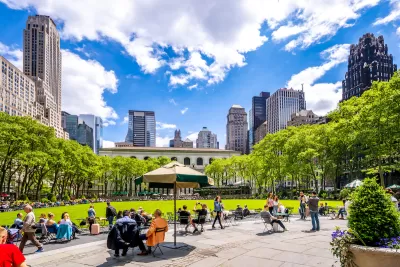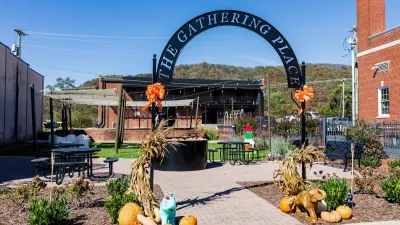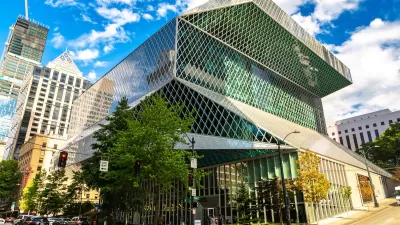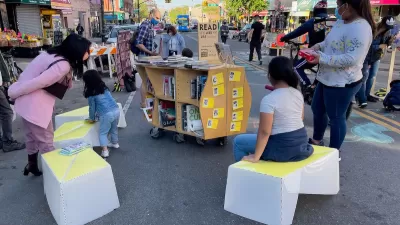The public spaces where people can spend time among strangers without buying something are crucial to healthy cities—and are quickly disappearing.

Writing in Strong Towns, Tiffany Owens Reed vividly describes the pleasures of ‘third spaces,’ those truly public spaces that provide a safe, vibrant place to just exist without having to purchase anything or be engaged in any particular activity.
These spaces attract all kinds of people and facilitate all kinds of activities. They’re organic, uncoordinated, and leisurely. They function like an extension of our own living rooms or backyards. Their value comes from providing a space where strangers can happily be alongside other strangers doing something they enjoy.
Owens Reed doesn’t have an explanation for the phenomenon, but asserts that “there’s something magnetic about spaces where strangers can be alone together, and in our increasingly fragmented and polarized society, this is valuable.” To that end, cities should protect these increasingly rare spaces where all kinds of people can mingle.
Owens Reed recommends three keys to creating good public spaces: keeping them closed to cars; making them “clearly defined and slightly enclosed” to create a sense of safety; and placing them near businesses without making them transaction-focused. “When public parks, squares, and plazas are situated close to practical businesses, it creates a beneficial cycle for them both: public spaces provide places to be while businesses provide options of things to do, both increasing foot traffic, overall vitality, and safety.”
The piece concludes with a provocative question: “What would our cities look like if we designed for all of life, not just a few activities that we can count on for tax revenue?”
FULL STORY: No Purchase Necessary

Alabama: Trump Terminates Settlements for Black Communities Harmed By Raw Sewage
Trump deemed the landmark civil rights agreement “illegal DEI and environmental justice policy.”

Study: Maui’s Plan to Convert Vacation Rentals to Long-Term Housing Could Cause Nearly $1 Billion Economic Loss
The plan would reduce visitor accommodation by 25% resulting in 1,900 jobs lost.

Planetizen Federal Action Tracker
A weekly monitor of how Trump’s orders and actions are impacting planners and planning in America.

Wind Energy on the Rise Despite Federal Policy Reversal
The Trump administration is revoking federal support for renewable energy, but demand for new projects continues unabated.

Passengers Flock to Caltrain After Electrification
The new electric trains are running faster and more reliably, leading to strong ridership growth on the Bay Area rail system.

Texas Churches Rally Behind ‘Yes in God’s Back Yard’ Legislation
Religious leaders want the state to reduce zoning regulations to streamline leasing church-owned land to housing developers.
Urban Design for Planners 1: Software Tools
This six-course series explores essential urban design concepts using open source software and equips planners with the tools they need to participate fully in the urban design process.
Planning for Universal Design
Learn the tools for implementing Universal Design in planning regulations.
Caltrans
Smith Gee Studio
Institute for Housing and Urban Development Studies (IHS)
City of Grandview
Harvard GSD Executive Education
Toledo-Lucas County Plan Commissions
Salt Lake City
NYU Wagner Graduate School of Public Service





























